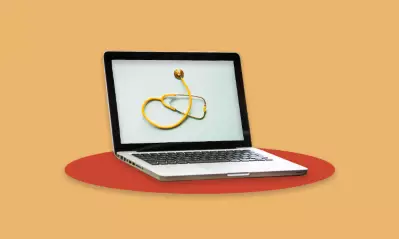Career Guide
Health information management director
If you excel at data analysis, are highly organized, love to tackle challenges and have an eagle eye for detail, you could be on your way to forging a career path as a health information management director.
If you excel at data analysis, are highly organized, love to tackle challenges and have an eagle eye for detail, you could be on your way to forging a career path as a health information management director.
Career overview
Health information management (HIM) directors are a type of medical and health services manager who play a pivotal role in the healthcare industry. A HIM director's responsibilities may include:
- Operations management: Overseeing the operations of medical records and health information systems
- Data management: Ensuring accurate recording of all patient data, including treatment records and patient health outcomes, and maintaining secure storage and efficient accessibility of patient data for providers
- Compliance and policy development: Developing and enforcing policies to comply with federal and state regulations on privacy and security of patient information
- Quality assurance and improvement: Analyzing health information to identify trends or areas for quality assurance and strategizing on improving patient health care based on data analysis
- Communication and coordination: Facilitating effective communication between medical, administrative and IT departments regarding health information management
Take your next step
In 2023, there were approximately 562,700 medical and health services managers in the U.S. workforce, according to the Bureau of Labor Statistics (BLS). The largest employers of these professionals included state, local and private hospitals; physician offices; and nursing and residential care facilities.[1]
These experts may work alongside operations professionals, including data analysts, financial officers, software developers and medical records practitioners. Some reported job titles related to this role include health information manager, medical records director, clinical director, nursing director and healthcare system director, according to O*NET.
Advantages
As the Baby Boomer generation ages, the demand for healthcare workers is expected to grow. Therefore, a higher number of medical and health services managers will likely be needed to manage staff, coordinate patient care in team-based environments and oversee the organization and management of electronic health records (EHRs), BLS reports.
Career-relevant skills
In day-to-day experience in this role, health information management directors may demonstrate skills in the following areas:
- Systems thinking
- Performance improvement
- Marketing - economic implications
- Data analysis
- Information management
- Quality management through the triple aim
- Accounting
- Management
- Marketing - ethical implications
- Compliance and privacy management
- Policy enforcement
- Risk management
- Supply chain management
- Economics
- Marketing - consumer choice implications
- Environmental scanning
- Operations
- Change management
- Policy and governance
- Population health
- Advocacy
Regularly used on the job
As a medical and health services manager, essential soft skills include meticulous attention to detail, strong leadership abilities, analytical thinking and effective communication, BLS states.
Salary range $86 - 157K
25th to 75th percentile
Medical and health services managers — including health information management directors —within the 25th to 75th percentile earned salaries ranging from $86,080 to $157,640 in 2023, according to BLS nationwide statistics.[1]
61,400 jobs
Projected annual job opportunities
National job opportunities for medical and health services managers — including health information management directors — are projected to grow by 29% between 2023 and 2033, BLS reports. [1]
[1] Salary ranges are not specific to students or graduates of University of Phoenix. The salary ranges, job opportunities and outcomes presented represent the larger job category, which includes the particular job title. Actual outcomes vary based on multiple factors, including prior work experience, geographic location and other factors specific to the individual. University of Phoenix does not guarantee employment, salary level or career advancement. BLS data is geographically based. Information for a specific state/city can be researched on the BLS website. The BLS Projected Growth for 2023-2033 is published by the US Bureau of Labor Statistics. This data reflects the BLS’ projections of national (not local) conditions. These data points are not specific to University of Phoenix students or graduates.
Education and experience

Education requirements for health information management director job candidates may vary. While some employers may allow candidates with a bachelor’s degree to apply, others may prefer candidates with a master’s degree. A graduate degree may enhance job prospects and strengthen your credibility as a candidate. You may consider programs in a related area of study, such as health information management, health administration or nursing.
You may also want to consider certificate programs to complement your path towards the health information management director career. Certificates are shorter than degree programs but can be valuable as they can help you stay updated on new trends in your field and build up your real-world skills. At the University of Phoenix, we've designed our certificate programs with you in mind — especially if you've already earned a bachelor's degree and are looking to dig deeper into your specialty or broaden your expertise in the field.
Alongside your educational qualifications, you will likely need work experience in health information management or a related area. The required length of previous experience may vary by employer. You can gain relevant practice in a professional environment through entry-level positions, such as medical records specialist, or fellowship opportunities, which may be paid and possibly lead to employment. From there, you can advance into mid-level roles, such as health information manager, before pursuing the health information management director position.
Once you’ve worked as a health information management director for some time, you may decide to take your next career step. You may consider pursuing new responsibilities by expanding your scope of work or seeking higher-level executive roles , which may require a master’s degree, according to BLS.
Phoenixes in the workplace
Meet Wayland W., an alum whose journey from adversity to leadership exemplifies resilience. As a director of a non-profit health care system, his UOPX education empowered him to lead with heart, transforming his career and allowing him to create positive change in healthcare.
Wayland W. | MHA 2016
Phoenixes in the workplace
Meet Wayland W., an alum whose journey from adversity to leadership exemplifies resilience. As a director of a non-profit health care system, his UOPX education empowered him to lead with heart, transforming his career and allowing him to create positive change in healthcare.
Programs
At University of Phoenix, we offer several master's and doctoral degrees, as well as certificates, that lead to the health information management director career outcome. Our flexible approach to learning means you can integrate higher education into your life, advancing one course at a time every six weeks. Explore our offerings to find out which program is aligned to your goals.

How can University of Phoenix support me in pursuing my career goals?
Once you become a Phoenix, you'll gain access to our Career Navigator tools, which can help you evaluate career options, track career-relevant skills and discover job postings suited to your needs. From resumé building and interview preparation to networking and mentorship, University of Phoenix offers career services for life to all students and graduates. Dive deeper into our career services, resources and tools to find out how we can help you reach your goals.





